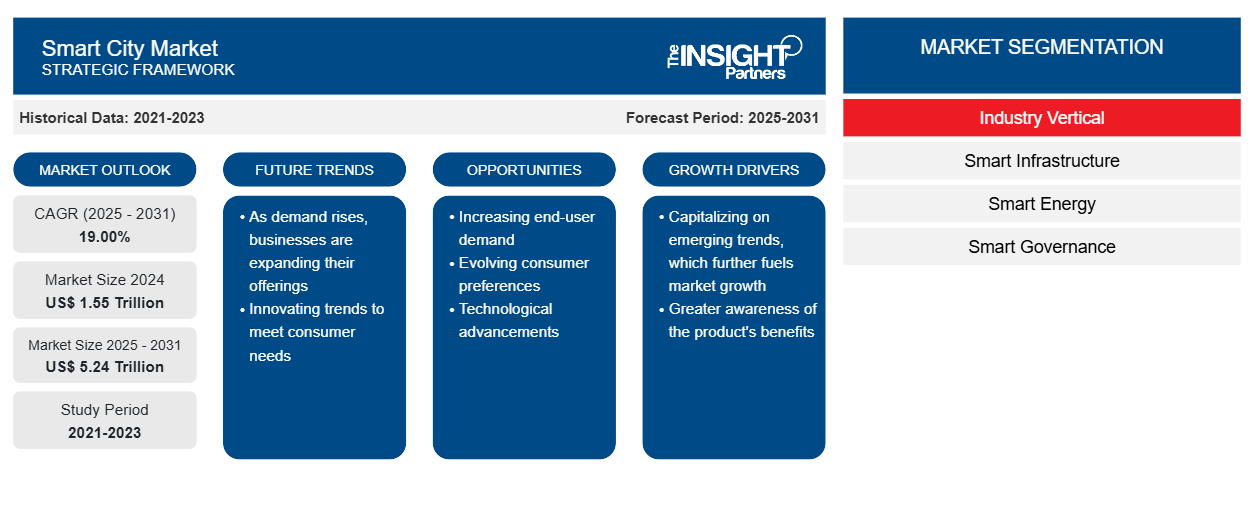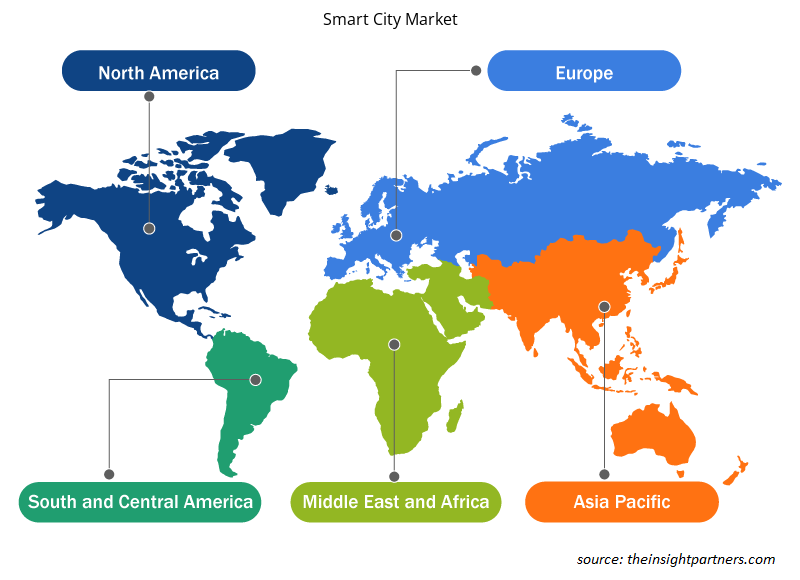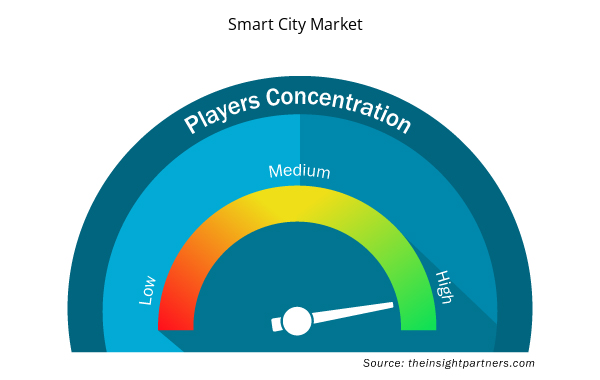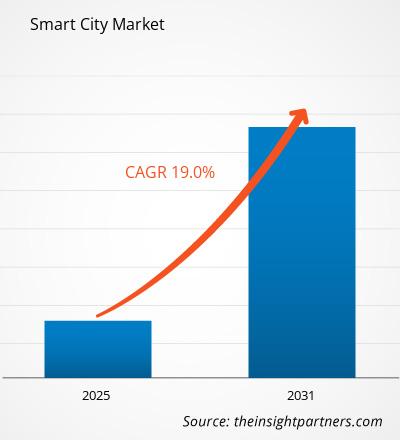The smart city market is expected to grow from US$ 1094.23 billion in 2022 to US$ 3110.58 billion by 2031; it is estimated to grow at a CAGR of 19.0% from 2022 to 2031.
Smart cities are a concept where various aspects of a city or a province are based upon advanced technologies. These cities use digital technology and the internet to enhance the performance of services and quality of life by optimizing energy and improving security for the citizens. The smart city concept aims to develop robust connectivity and infrastructure to enable real-time information access for building a management system that efficiently connects citizens, service providers, and administrators. Furthermore, the government ensures that inhabitants actively participate in improving the overall sustainability and productivity of services by furnishing the cities with elemental infrastructure.
Smart infrastructure technology has significantly changed over time, and various disciplines, such as building automation for facility and emergency response management, building energy optimization, parking management, and in-building communication systems, are now being widely adopted. Furthermore, Green building initiatives have taken center stage across many countries, especially across Europe, North America, and APAC regions. Focus on reduction in energy consumption and concerns over the proliferation of environmental wastes are the major driving factors for the development of smart cities. Transportation is expected to be another major focus area during the smart city market forecast period.
Customize This Report To Suit Your Requirement
You will get customization on any report - free of charge - including parts of this report, or country-level analysis, Excel Data pack, as well as avail great offers and discounts for start-ups & universities
Smart City Market: Strategic Insights

- Get Top Key Market Trends of this report.This FREE sample will include data analysis, ranging from market trends to estimates and forecasts.
Customize This Report To Suit Your Requirement
You will get customization on any report - free of charge - including parts of this report, or country-level analysis, Excel Data pack, as well as avail great offers and discounts for start-ups & universities
Smart City Market: Strategic Insights

- Get Top Key Market Trends of this report.This FREE sample will include data analysis, ranging from market trends to estimates and forecasts.
Depletion of energy sources and inefficient resource management are gradually becoming major concerns across the globe. This is driving the demand for smart energy solutions across the globe. Smart energy management systems use sensors, advanced meters, renewable energy sources, digital controls, and analytic tools to automate, monitor, and optimize energy distribution and usage. Such systems optimize grid operation and usage by balancing the needs of the different stakeholders involved (consumers, producers, and providers). There are several innovations in smart energy infrastructure, such as distributed renewable generation, microgrids, smart grid technologies, energy storage, automated demand response, virtual power plants, and demand-side innovations such as electric vehicles and smart appliances. Such innovations provide an extended network of intelligent energy devices across a city, with a detailed view of energy consumption patterns, enabling community-based energy monitoring programs and improving the energy efficiency of buildings.
Regional Analysis of Smart City Market
From the regional perspective, North America held the largest share of the global smart city market in 2021. The high adoption of technologically advanced solutions across all industrial sectors of the region is contributing to the growth of the North America smart city market. The increasing government support for technology adoption through the announcement of subsidies, tax credits, and funding to industries for technological development is further catalyzing the market, thereby offering lucrative business opportunities to the smart city market players operating across the region. For instance, in November 2021, the US federal government announced funding of US$ 500 million under the Infrastructure Investment and Jobs Act to overcome the challenges of smart cities. Additionally, the presence of several smart city market players across the region, engaged in constant innovation and product development, is further driving the North America smart city market.
Market Insights – Smart City Market
Industry Vertical-Based Insights
Based on industry vertical, the smart city market size is segmented into smart infrastructure, smart energy, smart governance, smart transportation, smart healthcare, and smart education. The smart transportation segment is expected to grow at the highest CAGR over the forecast period. Smart transportation is an innovative traffic and mobility infrastructure built on new technologies and designed to save resources for maximum efficiency. Deployment of key technologies such as cloud computing, 4G, machine-to-machine learning, and operations in novel projects is expected to become more commonly applied to smart transport systems such as railways, providing efficient passenger and freight services across the globe, resulting in the generation of a pool of opportunities for numerous industry players in the ecosystem of smart cities. This would also attract various capitalists and investors, leading to tremendous growth in the smart transportation market.
Smart City Market Regional Insights
The regional trends and factors influencing the Smart City Market throughout the forecast period have been thoroughly explained by the analysts at Insight Partners. This section also discusses Smart City Market segments and geography across North America, Europe, Asia Pacific, Middle East and Africa, and South and Central America.

- Get the Regional Specific Data for Smart City Market
Smart City Market Report Scope
| Report Attribute | Details |
|---|---|
| Market size in 2024 | US$ 1.55 Trillion |
| Market Size by 2031 | US$ 5.24 Trillion |
| Global CAGR (2025 - 2031) | 19.00% |
| Historical Data | 2021-2023 |
| Forecast period | 2025-2031 |
| Segments Covered |
By Industry Vertical
|
| Regions and Countries Covered | North America
|
| Market leaders and key company profiles |
Smart City Market Players Density: Understanding Its Impact on Business Dynamics
The Smart City Market market is growing rapidly, driven by increasing end-user demand due to factors such as evolving consumer preferences, technological advancements, and greater awareness of the product's benefits. As demand rises, businesses are expanding their offerings, innovating to meet consumer needs, and capitalizing on emerging trends, which further fuels market growth.
Market players density refers to the distribution of firms or companies operating within a particular market or industry. It indicates how many competitors (market players) are present in a given market space relative to its size or total market value.
Major Companies operating in the Smart City Market are:
- ABB Ltd.
- Accenture
- Cisco
- Ericsson
- Schneider Electric
- GE
Disclaimer: The companies listed above are not ranked in any particular order.

- Get the Smart City Market top key players overview
Players operating in the smart city market are mainly focused on developing advanced and efficient products.
- In October 2021, Siemens AG announced the acquisition of Squills. This acquisition strengthened the company’s mobility solutions, such as reservation and ticketing software.
- In May 2021, Microsoft Corporation and Itron Inc entered into a strategic partnership to collaboratively offer highly advanced Mobile device management (MDM) services to their clients.
The smart city market size is segmented into five major regions—North America, Europe, Asia Pacific (APAC), Middle East & Africa, and South America. In 2022, North America led the market with a substantial revenue share, followed by Europe. Further, Asia Pacific is expected to register the highest CAGR in the smart city market from 2022 to 2031.
The key global smart city market players include ABB Ltd; Cisco Systems, Inc.; Oracle Corporation; Microsoft Corporation; and IBM Corporation. Apart from these, several other players were analyzed during the research study, including Accenture, General Electric Company, Schneider Electric SE, Siemens AG, and Ericsson AB.
- Historical Analysis (2 Years), Base Year, Forecast (7 Years) with CAGR
- PEST and SWOT Analysis
- Market Size Value / Volume - Global, Regional, Country
- Industry and Competitive Landscape
- Excel Dataset


- Nuclear Decommissioning Services Market
- Dropshipping Market
- Vision Care Market
- Extracellular Matrix Market
- Genetic Testing Services Market
- Adaptive Traffic Control System Market
- Legal Case Management Software Market
- Dairy Flavors Market
- Pharmacovigilance and Drug Safety Software Market
- Cosmetic Bioactive Ingredients Market

Report Coverage
Revenue forecast, Company Analysis, Industry landscape, Growth factors, and Trends

Segment Covered
Industry Vertical

Regional Scope
North America, Europe, Asia Pacific, Middle East & Africa, South & Central America

Country Scope
This text is related
to country scope.
Trends and growth analysis reports related to Electronics and Semiconductor : READ MORE..
The List of Companies - Smart Cities Market
- ABB Ltd.
- Accenture
- Cisco
- Ericsson
- Schneider Electric
- GE
- Microsoft
- IBM Corporation
- Oracle
- Siemens

 Get Free Sample For
Get Free Sample For